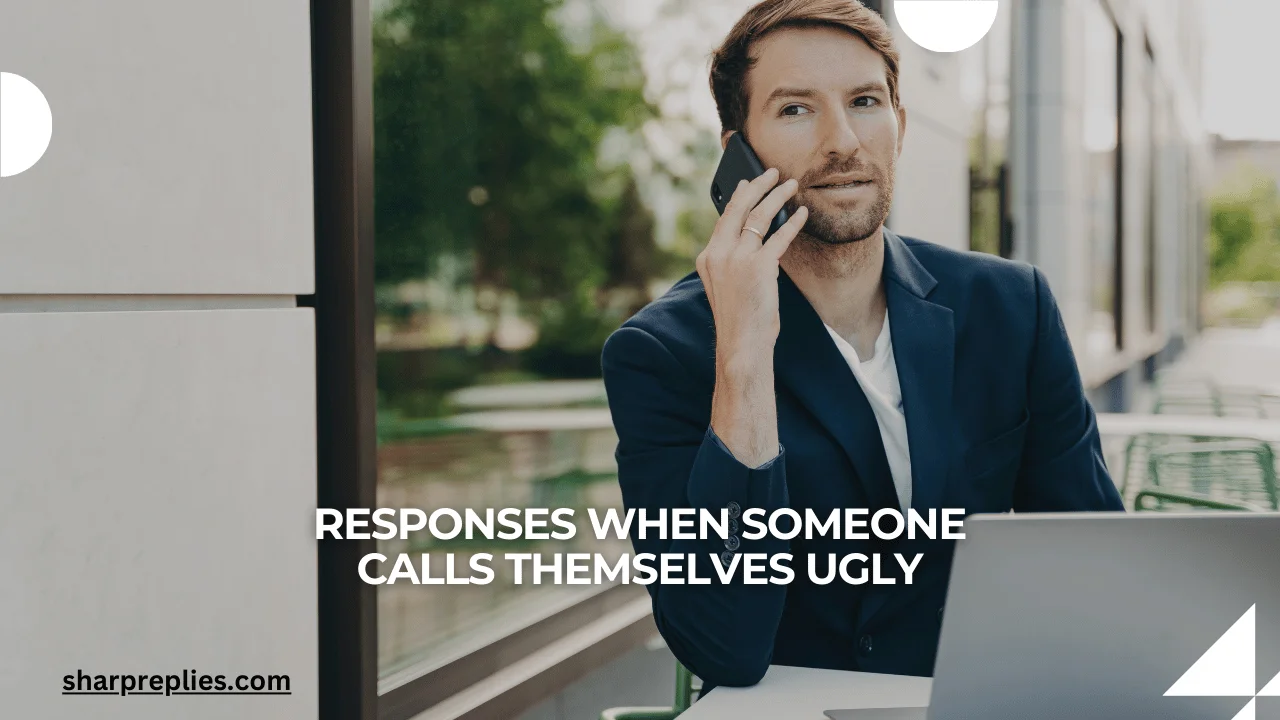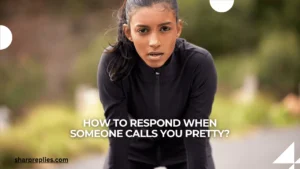We’ve all been there—someone we care about looks at themselves in the mirror and says something hurtful: “I’m so ugly” or “I look terrible today.”
It can be jarring, leaving us unsure of how to respond. While we may want to quickly offer reassurances or offer compliments, the situation is more complex than just saying “No, you’re beautiful!” These moments often point to deeper issues of self-esteem, body image, or emotional vulnerability.
How we respond can help or hinder their emotional state.
In this article, we’ll explore thoughtful responses to someone who calls themselves ugly. We’ll uncover why people say such things, how to approach the conversation with empathy and kindness, and how to help others see their own inherent value.
The goal is not just to offer compliments but to help someone start seeing themselves through a more positive and realistic lens.
Contents
- 1 Understanding Why Someone Might Call Themselves Ugly
- 2 Responding with Empathy: Validate Their Feelings
- 3 Encouraging a Shift in Perspective: Focusing on Inner Qualities
- 4 Avoiding Cliché Responses: Why “You’re Beautiful” Isn’t Always Enough
- 5 Helping Them Build Self-Esteem and Confidence Over Time
- 6 Conclusion:
- 7 FAQ’s
- 7.0.1 Why do people call themselves ugly?
- 7.0.2 Should I argue when someone says they are ugly?
- 7.0.3 How can I help someone who constantly calls themselves ugly?
- 7.0.4 What if they don’t believe the compliments I give them?
- 7.0.5 How can I avoid reinforcing negative self-talk?
- 7.0.6 Is it okay to tell someone they’re not ugly?
Understanding Why Someone Might Call Themselves Ugly
Before responding to someone who refers to themselves as ugly, it’s important to understand the root causes of such statements.
People who call themselves ugly may be dealing with deep-seated insecurities, negative self-perception, or social pressures related to beauty standards. This could be a result of bullying, harsh comparisons, or unrealistic beauty ideals propagated by social media and advertising.
It’s essential to recognize that self-deprecating comments aren’t always about seeking validation or compliments.
They may reflect real struggles with self-esteem or feelings of inadequacy. Understanding this helps guide a more compassionate response, one that encourages growth and self-reflection rather than just trying to dismiss the feelings altogether. Acknowledging their pain, instead of invalidating it, can be a more powerful first step.
Responding with Empathy: Validate Their Feelings
When someone calls themselves ugly, your first instinct might be to immediately disagree and offer compliments. While well-meaning, this response can sometimes feel dismissive of their emotions. Instead, try validating their feelings first.
Saying something like, “I can see you’re feeling down right now, and I’m really sorry you feel this way” shows that you acknowledge their hurt without minimizing it.
Empathy helps create an environment where they feel heard and understood.
You don’t need to jump straight to reassuring them; instead, allow space for them to talk about why they’re feeling this way. Saying “It sounds like you’re really upset—want to talk about it?” can open the door to a meaningful conversation. By focusing on the emotions behind the words, you let the person know that their feelings matter.
Encouraging a Shift in Perspective: Focusing on Inner Qualities
When someone calls themselves ugly, it can be helpful to gently encourage a shift in focus from external appearance to inner qualities.
The term “ugly” is often tied to superficial aspects, but true beauty comes from within. Rather than simply focusing on external compliments, consider highlighting their character, intelligence, kindness, or strength.
For example, a good response might be, “I don’t think looks define beauty at all. You have such a kind heart, and that’s what truly shines through.”
By shifting the focus, you encourage them to think about their worth beyond appearance, helping to foster self-acceptance and self-love in a more holistic way.
Avoiding Cliché Responses: Why “You’re Beautiful” Isn’t Always Enough
It’s easy to quickly jump to the cliché response of “No, you’re beautiful!” or “I don’t know why you’d say that.” While these responses are well-meaning, they don’t always address the root cause of their feelings. Instead, they may inadvertently come off as dismissive or fail to encourage self-reflection.
Rather than focusing solely on their outward appearance, try to engage with them on a deeper level. “I know you’re feeling down about how you look right now, but I want you to remember how incredible you are as a person, inside and out.”
This approach shifts the conversation away from external validation to helping them build a healthier and more balanced view of themselves.
Helping Them Build Self-Esteem and Confidence Over Time

Responding to someone who calls themselves ugly is not just about what you say in the moment—it’s about helping them rebuild their confidence over time.
Encouragement, kind words, and showing that you care are key, but offering practical tools for self-improvement and reflection can help them see themselves more positively.
Encourage activities that promote self-love, such as journaling about their strengths, practicing affirmations, or engaging in activities that make them feel good about themselves. “It’s tough right now, but I know you have so much to offer.
Let’s focus on the things you’re proud of.” Building their confidence won’t happen overnight, but with your support, they can start the journey toward a healthier relationship with themselves.
Conclusion:
When someone calls themselves ugly, it’s not just a comment on their appearance; it’s often a cry for help, a reflection of insecurity, or a deep-seated belief in their worthlessness.
How we respond to these statements can either reinforce their negative perceptions or help them reshape their self-image.
By offering responses that are empathetic, thoughtful, and focused on inner qualities, we can guide someone toward a more positive and balanced view of themselves.
While you might not be able to change their feelings overnight, your support and care can be a powerful tool in helping them rebuild their self-esteem. Remember, your words matter—they can inspire someone to see themselves with kindness and understanding, and that can make all the difference.
FAQ’s
Why do people call themselves ugly?
People may call themselves ugly due to low self-esteem, insecurities, or feeling inadequate due to societal standards of beauty.
Should I argue when someone says they are ugly?
Rather than arguing, it’s important to validate their feelings and offer support. Arguing can shut down the conversation and make them feel dismissed.
How can I help someone who constantly calls themselves ugly?
Encourage them to focus on their positive qualities and help them build self-love through affirmations, self-reflection, and activities that improve their confidence.
What if they don’t believe the compliments I give them?
Sometimes, people won’t immediately believe compliments. In these cases, it’s important to be patient and remind them that beauty is more than just appearance—it’s about character and heart.
How can I avoid reinforcing negative self-talk?
Respond in a way that encourages self-reflection without accepting negative labels. For example, instead of agreeing with their statement, offer a perspective that challenges their view on beauty.
Is it okay to tell someone they’re not ugly?
While it’s important to reassure them, focus on encouraging them to see their worth beyond their appearance. This will lead to a more sustainable change in their self-perception.








